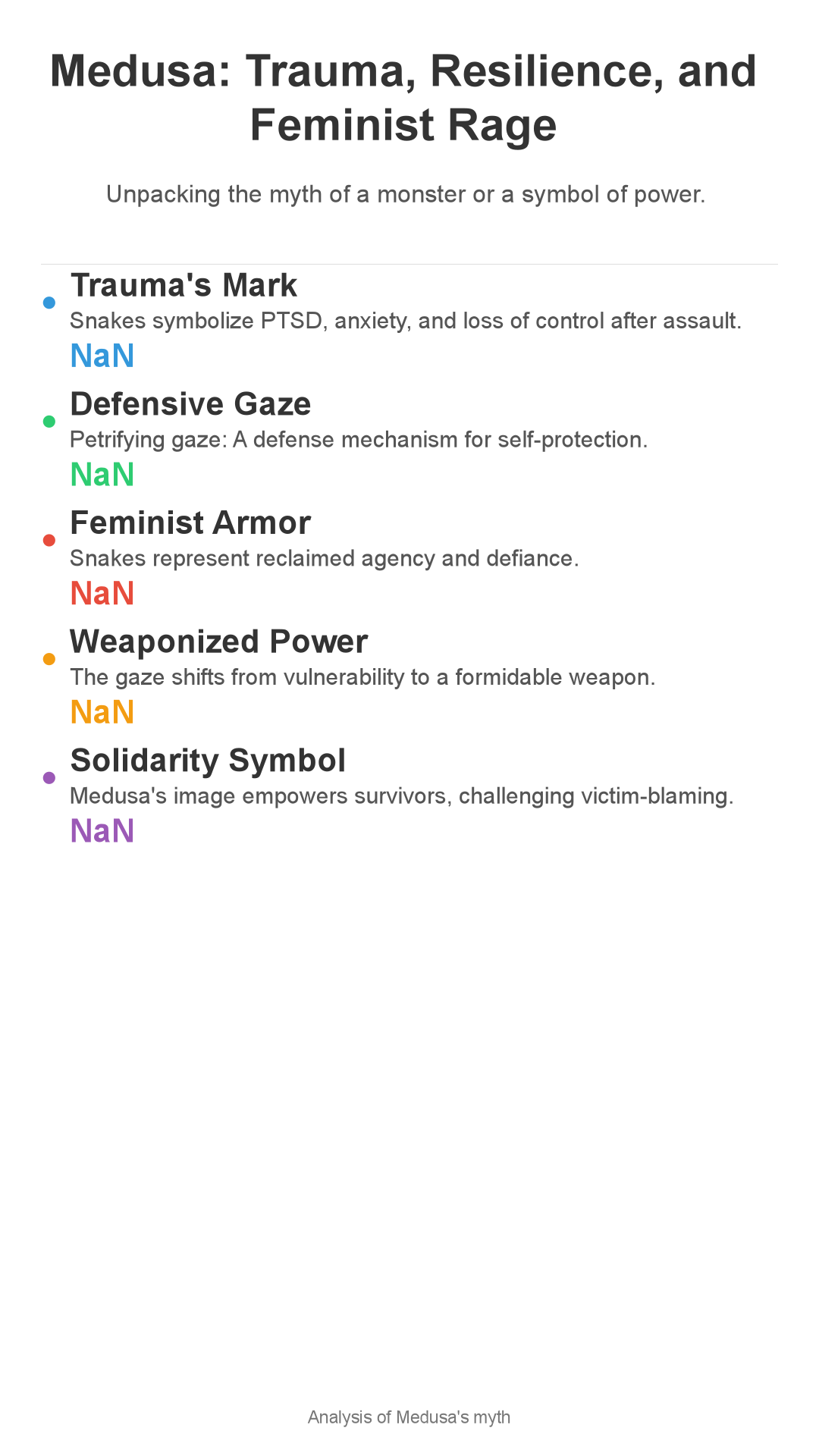
Was Medusa a terrifying monster, or a woman tragically misunderstood and unfairly demonized? In this
Have we misunderstood Medusa for centuries? What if the snakes weren’t a curse, but a fierce shield forged from trauma, a visible sign of pain transformed into formidable power? Stay tuned, smash that like button, and follow for more myth-busting explorations!
For generations, Medusa has been portrayed as the ultimate monster: a terrifying gorgon whose serpentine hair and petrifying gaze made her a figure of pure dread.
But is this iconic image truly a depiction of inherent evil, or is it a complex symbol of trauma, resilience, and righteous feminist rage?
Medusa as a Victim of Trauma: Reinterpreting the Myth
The most widely known version of Medusa’s story originates from Ovid’s Metamorphoses. In this account, Medusa is depicted as a beautiful priestess of Athena who is brutally raped by Poseidon within Athena’s own temple.
Athena, incensed by the desecration of her sacred space, punishes Medusa by transforming her beautiful hair into venomous snakes. This “punishment” is the heart of the issue.
Examining Ovid’s Version of the Myth
Ovid’s narrative is deeply problematic. It subtly shifts the blame for the violation onto Medusa herself, rather than holding the perpetrator, Poseidon, accountable.
Athena’s reaction is equally disturbing; instead of offering support or seeking justice for Medusa, she inflicts a monstrous transformation upon her.
Psychological Interpretations: The Snakes as PTSD
From a psychological perspective, the snakes can be interpreted as a powerful manifestation of PTSD, overwhelming anxiety, and a profound loss of control following a traumatic event.
The writhing, uncontrollable serpents could symbolize the intrusive, chaotic thoughts and intense emotions that often plague trauma survivors.
The paralyzing gaze can be viewed as a defensive mechanism, a desperate attempt to protect herself from further harm by forcing others to keep their distance.
Parallels with Real-World Experiences of Trauma Survivors
The agonizing feeling of being monstrous, the overwhelming desire for isolation, and the profound difficulty in trusting others are common experiences for trauma survivors.
Medusa’s transformation into a “monster” tragically mirrors the internal experience of many survivors who feel irrevocably changed and alienated from society.
The intense fear of intimacy and the constant struggle to form meaningful connections can lead to profound isolation, mirroring Medusa’s exile.
The Snakes as Feminist Armor: Reclamation of Power
Beyond the trauma narrative, Medusa’s snakes can also be interpreted as a potent symbol of feminist power and defiant resistance. They represent a powerful reclaiming of agency and a profound transformation from victim to empowered figure, refusing to be defined by her assault.
The Gaze as a Weapon: Shifting the Power Dynamic
The gaze, which was initially a source of vulnerability and violation, becomes Medusa’s most formidable weapon.
She transforms the act of being looked at – an act that often objectifies, controls, and diminishes women – into a source of undeniable power.
By turning those who threaten her into stone, she reclaims control over her own body and her own narrative, refusing to be a passive object.
The Snakes as a Symbol of Feminine Rage
The snakes themselves can be seen as a visceral symbol of feminine rage and fierce resistance against patriarchal oppression.
They are untamed, uncontrollable, and inherently threatening to the established order, embodying the very qualities that patriarchal societies seek to suppress in women.
They represent the suppressed anger and righteous frustration of women who have been silenced and marginalized for centuries.
Medusa’s Image as a Symbol of Solidarity
Medusa’s image has become a powerful symbol of solidarity and profound empowerment for women who have experienced sexual assault and other forms of violence.
Her story resonates deeply with those who have been silenced, blamed, and ostracized by a society quick to judge.
By reclaiming Medusa’s narrative, survivors can find strength and validation in their own experiences and challenge the societal norms that perpetuate victim blaming and silence.
Deconstructing the Traditional Narrative: Challenging the Patriarchal Gaze
To truly understand Medusa, we must actively deconstruct the traditional, patriarchal narrative that has defined her for centuries. This requires critically examining the pervasive male gaze in art and literature and questioning the traditionally glorified role of Perseus in her tragic story.
Analyzing the Male Gaze in Art and Literature
Throughout history, Medusa has been consistently portrayed as a monster to be feared, loathed, and ultimately conquered.
Her image has been strategically used to reinforce patriarchal power structures and to demonize female sexuality and agency, painting her as a threat to male dominance.
The male gaze, as defined by feminist film theorist Laura Mulvey, objectifies women and reduces them to passive objects of male desire and control.
Examining the Role of Perseus
Perseus, the celebrated hero who beheads Medusa, is often presented as a courageous and virtuous figure, a shining example of masculine heroism.
However, from a feminist perspective, his actions can be interpreted as a brutal act of violence against a woman who was already a victim of horrific abuse and injustice.
Is he truly a hero, or is he simply an agent of patriarchal power silencing a dissenting voice?
The traditional narrative often glorifies his act of violence, reinforcing the dangerous idea that women who challenge the status quo must be punished and silenced to maintain order.
The Importance of Reinterpreting Myths
Reinterpreting myths from a feminist perspective is crucial for challenging deeply ingrained societal biases and fostering a more nuanced and empathetic understanding of female characters who have been historically misrepresented.
By questioning the traditional narratives and critically examining the underlying power dynamics at play, we can begin to dismantle the patriarchal structures that have shaped our understanding of women and their roles in society.
The Enduring Relevance of Medusa in Contemporary Culture
Medusa’s story continues to resonate profoundly in contemporary culture, finding renewed expression in art, literature, and activism, inspiring new generations to challenge injustice. Her image has been powerfully reclaimed and reinterpreted by artists and activists who seek to challenge harmful narratives and promote female empowerment, giving voice to the voiceless.
Medusa as a Symbol in Contemporary Art, Literature, and Activism
Medusa has become a potent symbol in contemporary art, literature, and activism, representing strength, resilience, and resistance in the face of adversity.
Artists are reimagining her image, portraying her not as a monstrous figure of fear, but as a powerful symbol of survival and defiance.
Writers are exploring her story from a feminist perspective, giving voice to her pain, her anger, and her unwavering spirit.
Medusa’s Resonance with Modern Social Movements
Medusa’s story resonates deeply with modern social movements such as #MeToo, body positivity, and the ongoing fight against victim blaming and slut-shaming.
Her experience of being violated, silenced, and demonized tragically mirrors the experiences of countless women who have bravely come forward to share their stories of abuse, harassment, and discrimination.
Her image has become a powerful rallying cry for survivors, a symbol of unwavering solidarity and profound empowerment.
The Ongoing Need to Challenge Harmful Narratives
The ongoing need to challenge harmful narratives and create space for diverse and inclusive interpretations of female figures in mythology is paramount to achieving a more just and equitable world.
By questioning the traditional stories and amplifying marginalized voices, we can create a society that values empathy, understanding, and respect for all individuals.
So, what are your thoughts? Do you believe Medusa has been unfairly judged by history? Which aspects of her story resonate most deeply with you in today’s complex world?
If you found this deep dive into Medusa’s multifaceted story fascinating, please share it with your friends and fellow myth enthusiasts! Let’s keep the conversation going and continue to challenge the narratives that shape our world and our understanding of each other.

Enjoyed this? Check out our YouTube channel for video versions!
Enjoyed this? Check out our YouTube channel for video versions!



